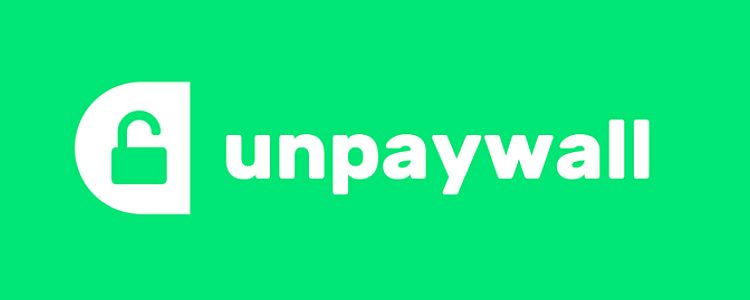Unpaywall Enables Access to Paywalled Research

We all know the scenario: Trawling through the literature databases, you come across an intriguing new article. The article promises to hold the answer to a burning question, support your exciting new theory, or even hold clues to what that confusing result from yesterday’s experiment could possibly mean. Your excitement quickly dies when the article turns out to be paywalled i.e. it is not freely available and requires an expensive journal subscription or steep fee for limited-time access. Your university library will usually have access to the journal. But if you are off campus, or not affiliated with an academic institution, then can you access paywalled research for free?
Unlocking Articles with Unpaywall
The answer is yes. Open access versions of these articles may be available from other sources. For example, the author may have uploaded the article to their own website. Wouldn’t it be great if we could access these versions automatically from anywhere? Unpaywall is a web browser extension that finds free versions of paywalled papers and is completely free and legal.
Unpaywall can be quickly installed in Google Chrome or Mozilla Firefox browsers. Once installed, it searches more than ten million uploaded open access resources using an algorithm that compares article titles. A gray lock symbol indicates that the search was unsuccessful and an open access version of that paper is not available. A green unlock symbol flags paywalled research articles with open access versions available elsewhere. Simply clicking on the green unlock symbol next to a paywalled article allows you to read it for free automatically. This tool was released on 4th April this year with promises to find open access papers at least 50% of the time. The tool is already improving and the creators recently reported that 85% of 2016’s most covered research papers were retrieved by the tool.
Improvement on Earlier Initiatives
Unpaywall represents a more user-friendly version of similar tools that were made available earlier. Impactstory, the team behind Unpaywall, had already developed oaDOI, which retrieves open access articles from a number of sources. The user simply inserts the article’s digital object identifier (DOI) into a search box and any available open access version is retrieved. The main advantage of Unpaywall is that it works in the background, automatically searching for and flagging open access articles while you browse. This makes searching the literature far less tedious and time-consuming.
Unpaywall has controversial competitors. Sci-Hub was set up in 2011 to bypass paywalls and allow users to download millions of academic articles for free. Many academics have praised Sci-Hub for promoting the open access movement, but publishing companies have made legal complaints of copyright infringement. The main difference between Sci-Hub and Unpaywall is where the articles are retrieved from. Unpaywall only retrieves open access resources that are legally provided by the authors, whereas Sci-Hub has been accused of obtaining articles by more controversial means.
Positive Impact on Medical Research
Unpaywall and similar tools will have positive repercussions on the open access movement. With a growing number of articles becoming freely available, the need to pay high journal subscriptions is gradually being eliminated. This is encouraging the transition to fully open access academic publishing. Eventually, this will eliminate the need for the tools (like Unpaywall) that made it possible in the first place. However, Unpaywall’s co-inventor Jason Priem recently told Nature that he would welcome this transition with a smile on his face!
Many believe that fully open access publishing will strengthen medical research in the future. It will promote co-operation between researchers, which will accelerate progress. In addition, making all articles open access will increase the transparency and accountability of scientific research. This will help to eliminate predatory journals and encourage research integrity. Furthermore, making research freely available to all will advance research progress in developing countries and promote research equality worldwide.









